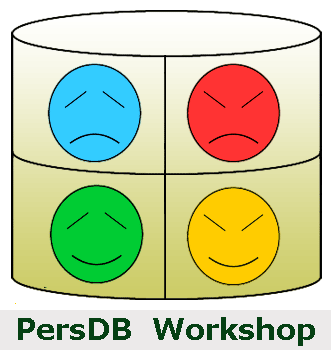|
Printer-friendly version of the program in PDF format.
|
|
Printer-friendly version of the proceedings in PDF format.
|
| |
| |
| |
Room: "Cardinal",
GRAND COPTHORNE WATERFRONT HOTEL,
392 Havelock Road, Singapore 169663.
|
| |
| |
| |
| 9:00-9:30 Opening Remarks | |
| |
| |
9:30-10:30 Session 1: Personalized Information Access
Chair: Mohamed Mokbel | |
| |
| |
| Personalization through Query Explanation and Document Adaptation
[abstract] [pdf] [presentation]
Abstract.
In this paper a new formal approach is proposed to retrieval
personalization, based on both a query personalization process
at the clientís side and a light document adaptation at
the information serverís side. The proposed solution relies
on the use of a domain ontology: queries and documents are
in fact indexed by sets of concepts. The query personalization
process is finalised to clarify what we call the central
query concepts based on the importance of linked concepts
in the considered ontology. The initial query as well as its
clarifications are sent to the server, which revises the document
representations based on both the query and the concepts
clarifications. The proposed solution does not require
that the information server maintains any user profile.
|
| |
| Anthony Ventresque - NTU Singapore, |
| Sylvie Cazalens - Universite de Nantes, |
| Thomas Cerqueus - Universite de Nantes, |
| Philippe Lamarre - Universite de Nantes, |
| Gabriella Pasi - Universita di Milano Bicocca |
| |
| |
| SQL QueRIE Recommendations: a query fragment-based approach
[abstract] [pdf] [presentation]
Abstract.
Relational database systems are becoming increasingly popular in
the scientific community to support the interactive exploration of
large volumes of data. In this scenario, users employ a query interface
(typically, a web-based client) to issue a series of SQL queries
that aim to analyze the data and mine it for interesting information.
First-time users, however, may not have the necessary knowledge
to know where to start their exploration. Other times, users may
simply overlook queries that retrieve important information. In this
work we describe a framework to assist non-expert users by providing
personalized query recommendations. The querying behavior
of the active user is represented by a set of query fragments, which
are then used to identify similar query fragments in the recorded
sessions of other users. The identified fragments are then transformed
to interesting queries that are recommended to the active
user. An experimental evaluation using real user traces shows that
the generated recommendations can achieve high accuracy.
|
| |
| Jayad Akbarnejad - San Jose State University, |
| Magdalini Eirinaki - San Jose State University, |
| Suju Koshy - San Jose State University, |
| Duc On - San Jose State University, |
| Neoklis Polyzotis - UC Santa Cruz |
| |
| |
| 10:30-11:00 Coffee Break | |
| |
| |
| 11:00-12:30 Panel: Social vs. Personal |
[abstract] [presentation 1] [presentation 2] [presentation 3]
Abstract.
The last few years we witnessed an impressive growth in social networks and in applications that add value
to their amassed information. At the same time, the continuing expansion of mobile platforms and applications
(e.g. iPhone), combined with the overwhelming supply of information and services, makes effective personalization
and context-awareness much required features. One may consider "personal" and "social" data management as
comprising two distinct directions with conflicting characteristics. However, it can be argued that they
complement each other and that in future applications they will ultimately converge. This "personal vs. social"
predicament presents a number of interesting topics that will be explored by the panel:
- How the "social" and "personal" aspects interact? Where do they facilitate each other and where
do they conflict with each other?
- How social and individual preferences interrelate?
- Social vs. personal recommender systems: accuracy, acceptance, contribution, context-awareness
- Social networking vs. personal privacy: are they polar opposites?
- Social vs. individual trust: how different models of trust influence each other?
- How collective intelligence (e.g. collaborative tagging, collaborative filtering) can be exploited in personal systems?
- What are specific applications areas (e.g. e-learning?) where the convergence of "social"
and "personal" is most needed and could be best applied?
|
| |
| Tiziana Catarci (panel moderator), Universita di Roma ""La Sapienza"" - Italy, |
| Magdalini Eirinaki, San Jose State University - USA, |
| Zoltan Gyongyi, Stanford University - USA, |
| Carlo Meghini, CNR - Italy, |
| Mohamed Mokbel, University of Minnesota - USA |
| |
| |
| 12:30-14:00 Lunch (Kiwi Lounge - Level 2) |
| |
| |
14:00-15:30 Session 2: Personalization and the Semantic Web
Chair: Carlo Meghini | |
| |
| |
| Re-ranking Web Service Search Results Under Diverse User Preferences
[abstract] [pdf] [presentation]
Abstract.
Web service discovery aims at finding available services that
match a given service description. This involves mainly the
matchmaking of the functional parameters of the services,
whereas non-functional attributes can also be considered
and aggregated in the matching score of a candidate ser-
vice as additional criteria for ranking the results. In this
paper, we address the problem of re-ranking discovered ser-
vices that include nominal attributes in their descriptions in
order to satisfy users with diverse preferences. We present
an approach to diversify the search results combining the
degree of match on functional parameters with a method to
achieve good coverage with respect to the values of nominal
attributes. An evaluation on a publicly available dataset of
Semantic Web services is also presented.
|
| |
| Dimitrios Skoutas - L3S Research Center, |
| Mohammad Alrifai - L3S Research Center, |
| Wolfgang Nejdl - L3S Research Center |
| |
| |
| Adapting Generic Web Structures with Semantic Web Technologies: A Cognitive Approach
[abstract] [pdf] [presentation]
Abstract.
The research described in this paper focuses on adapting generic
Hypermedia Environments with the use of Semantic Web
technologies. The use of machine understandable semantics in
Web applications is increasing significantly, ranging from
semantic search queries to personalized product
recommendations. Given the significance of human factors in
Web structuresí transformations, we propose an Ontological Web
Personalization and Adaptation Mechanism based on usersí
cognitive parameters. This mechanism consists of a number of
interrelated components; modeling users based on their cognitive
parameters and providing content adaptation based on semantics.
An RDFa schema has been designed that enables standard
annotations in any XHTML Web-page, thus making structured
data available for the adaptation process, but also for any service
or tool that supports the same standard. Our work has been
positively evaluated using an existing commercial Web-site that
was filtered through the adaptation mechanism based on usersí
cognitive parameters.
|
| |
| Mario Belk - University of Cyprus, |
| Panagiotis Germanakos - University of Cyprus, |
| Nikos Tsianos - University of Athens, |
| Zacharias Lekkas - University of Athens, |
| Costas Mourlas - University of Athens |
| George Samaras - University of Cyprus |
| |
| |
| 15:30-16:00 Coffee Break |
| |
| |
16:00-17:00 Session 3: Evaluation Methodologies and Metrics
Chair: Magdalini Eirinaki | |
| |
| |
| A Benchmark for Context Data Management in Mobile Context-aware Applications
[abstract] [pdf] [presentation]
Abstract.
Over the last few years, computational power, storage capacity,
and sensing capabilities of mobile devices have significantly
improved. As a consequence, they have undergone
a rapid development from pure telecommunication devices
to small and ubiquitous computing platforms. Most importantly,
these devices are able to host context-aware applications,
i.e., applications that are automatically adjusted to
the current context of their user. This, in turn, requires sensing
support on the device, the possibility to store context information,
and to efficiently access this context information
for the automated adaptation of applications. In this paper,
we introduce a benchmark for context management in
mobile context-aware applications. We present in detail the
design and setup of the benchmark, based on an eHealth use
case. The benchmark evaluation considers context queries
on Android Nexus One cell phones and compares the performance
of different settings including relational and objectoriented
databases on the mobile device, and an RDF triple
store on a stationary computer. The results show significant
differences in the settings that have been evaluated and are
thus valuable indicators for database selection and system
design for mobile context-aware applications.
|
| |
| Nadine Froehlich - University Basel, |
| Thorsten Moeller - University Basel, |
| Steven Rose - University Basel, |
| Heiko Schuldt - University Basel |
| |
| |
| Combining Preference Relations: Completeness and Consistency
[abstract] [pdf] [presentation]
Abstract.
We introduce two criteria for judging "goodness" of the result
when combining preference relations in information systems:
completeness and consistency. Completeness requires
that the result must be the union of all preference relations,
while consistency requires that the result must be an acyclic
relation. In other words, completeness requires that the result
contain all pairs appearing in the preference relations,
and only those pairs; while consistency requires that for every
pair (x, y) in the result, it must be able to decide which
of x and y is preferred to the other. Obviously, when combining
preference relations, there is little hope for the result
to satisfy both requirements. In this paper, we classify
the various methods for combining preference relations,
based on the degree to which the result satisfies completeness
and consistency. Our results hold independently of the
nature of preference relations (quantitative or qualitative);
and also independently of the preference elicitation method
(i.e. whether the preference relations are obtained by the
system using query-log analysis or whether the user states
preferences explicitly). Moreover, we assume no constraints
whatsoever on the preference relations themselves (such as
transitivity, strict ordering and the like).
|
| |
| Nicolas Spyratos - University of Paris South, |
| Carlo Meghini - CNR |
| |
| |
| 17:00 PersDB 2010 Closing Remarks |
 Program
Program
